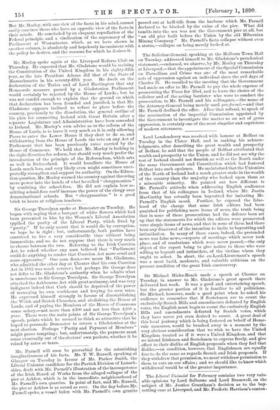Sir George Trevelyan spoke at Doncaster on Tuesday. He began
with saying that a bouquet of white flowers which had been presented to him by the Women's Liberal Association typified the purity of the Liberal Party, which lived by "purity." If he only meant that it would die by corruption, we hope he is right ; but, unfortunately, both parties have contrived to live a very considerable time without being immaculate, and we do not suppose that there is very much to choose between the two. Referring to the Irish Coercion Act, he asked whether any man believed that "Parliament could do anything to render that Coercion Act more cruel and more oppressive." One man does,—we mean Mr. Gladstone, who admitted the other day at Chester that his own Coercion Act in 1882 was much severer ; but perhaps Sir George does not defer to Mr. Gladstone's authority when he admits what is unwelcome to Sir George Trevelyan. Sir George Trevelyan attacked the Ashbourne Act with great acrimony, and was very indignant indeed that Cork should be deprived of the power of managing its own workhouse and levying its own rates. He expressed himself strongly in favour of disestablishing the Welsh and Scotch Churches, and abolishing the House of Lords, and of paying the Members of the House of Commons some salary,—not more than £300 and not less than £200 a year. These were the main points of Sir George Trevelyan's speech, points which he seemed to think so attractive that he hoped to persuade Doncaster to return a Gladstonian at the next election. Perhaps "Purity and Payment of Members" might prove tempting ; but, unfortunately, the payment must come eventually out of the electors' own pockets, whether it be raised by rates or taxes.


































 Previous page
Previous page